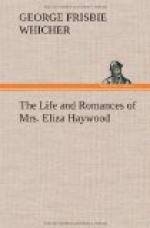The Prince and his bride return to their own country to receive the crown. By the most tender assiduities Albaraizor has almost succeeded in gaining the love of his wife when Abdelhamar again intrudes as ambassador to congratulate him on his coronation. Though her old love returns more strongly than ever, the Queen guards her honor well, and insists that her lover marry Selyma, a captive Princess. But that lady, stung by Abdelhamar’s indifference, learns to hate him, and out of revenge persuades the King that his wife is unfaithful to him. An indiscreet letter from Abdelhamar confirms his suspicions. He orders both Queen and ambassador cast into prison and by his woes destroys the happiness of the whole court.
The passages relating the monarch’s love and jealousy are described with a fulness entirely lacking in the tournament scene quoted above, and we may fairly infer that both writer and reader were more deeply interested in affairs of the heart than in feats of arms, however glorious. The emphasis given to love rather than to war in this tale is significant as a contrast to the opposite tendency in such romances of a century later as “Ivanhoe,” in which a tournament scene very similar in outline to that in “The Arragonian Queen” is told with the greatest attention to warlike detail, while the love story, though not allowed to languish, is kept distinctly subordinate to the narrative of chivalric adventure. Mrs. Haywood, however, was too warm-blooded a creature to put aside the interests of the heart for the sake of a barbarous Gothic brawl, and too experienced a writer not to know that her greatest forte lay in painting the tender rather than the sterner passions.
In this respect she forms a decided contrast to Defoe, whose men and women are almost never startled out of their matter-of-fact attitude. His picaresque characters, though outwardly rogues or their female counterparts, have at bottom something of the dissenting parson and cool-headed, middle-aged man of business. Whatever else they may be, they are never love-sick. Passion is to them a questionable asset, and if they marry, they are like to have the matter over with in the course of half a paragraph. Eliza Haywood,




